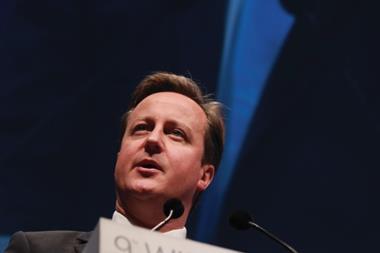Only real gamblers would bet on a majority government of either colour given the polls.

These indicate some form of minority government, with an alliance of parties, rather than a formal coalition, being the most likely outcome. If so, UK plc will not be troubled by which colour is in Downing Street, and thus nor will our real estate markets, which generally follow the health of the wider economy.
A minority government will only be able to tinker at the edges to get anything through Parliament. We face the enticing prospect of a five-year zombie period of government because the winning politicians, even with a minority position, will not want to risk losing the trappings of power by having a second, snap election.
Thus business should be able to carry on in a relatively benign environment where little of any significance will change. The annual deficit will not be dealt with, thus increasing the national debt towards £2 trillion by the next election in 2020. Interest rates will stay at these current levels, or lower, otherwise the government could not afford to service the debt. Inflation will stay deeply subdued because by 2020, two million more workers from the EU will have come to work here and kept wage inflation on the floor for most of the population. This is great for those with assets and property, but certain to increase the wealth gap between the haves and have nots.
Meanwhile, the UK will continue to be a global safe haven for investment in a troubled world, where it is hard to see problems being resolved over the next few years. What chance of peace and stability in the Middle East? Could President Putin become reasonable in his demands?
What prospect the Eurozone solves its fundamental flaws, thus restoring decent economic growth to deal with the serious debts of its member states?
The business community in the UK is taking these macro problems in its stride by concluding there is nothing it can do, so let the politicians fiddle while it ensures UK plc thrives. UK businesses and entrepreneurs will continue to be dynamic, hard-working and innovative.
I am constantly thrilled and a little envious of the new ideas. In real estate, technology is helping foster interesting ideas to respond to the housing crisis. For example, Flat Club is an online club-based marketplace to let flats and spare rooms to vetted young professionals; Dot Dot Dot provides guardians to live in flats for short-term stays (of weeks or months) for a minimal rent as long as they do 16 hours volunteering work each week, thus helping the landlord who wants peace of mind more than rent.
Technology is accelerating its ability to disrupt different industries, including the property market. For example, the high cost of office space in central London is finally forcing more companies to go paperless, to hot desk and to make staff work from home as a corporate expectation, not a privilege, to free up desk space. We may have only just begun: in five years’ time, we will not need raised floors; it will all be wireless and buildings could be measured remotely using GPS.
Entrepreneurial spirit is flourishing here more than ever, mainly thanks to the technological ease of setting up a company and selling globally, be it from your garage or a serviced business unit.
More new companies are being set up than ever before in the UK, with a net increase of 343,000 in 2014 compared with 273,000 in 2013. The UK’s relatively strong growth can be expected to continue regardless of the election result, thanks to technology and our business community… not the politicians.
Richard Tice is CEO of Quidnet Capital (and former CEO of CLS Holdings)






























No comments yet